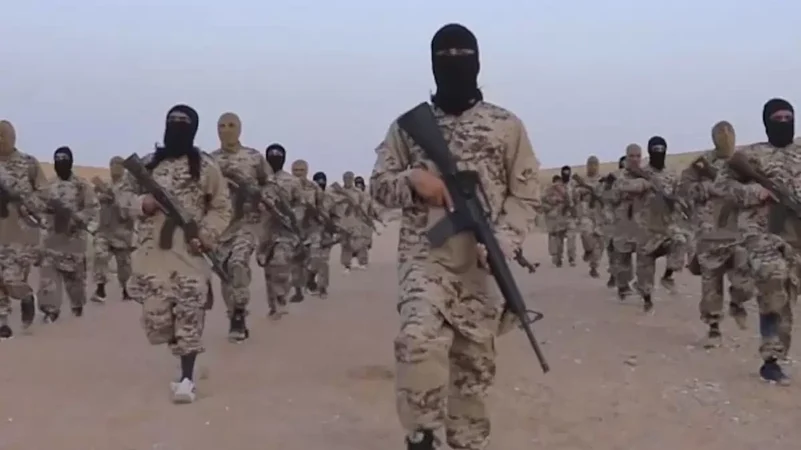The Islamic State group has claimed responsibility for a car bombing that killed a local police chief in Afghanistan.
Rising Violence In Afghanistan Under Taliban And The Role Of ISIS-K
The IS regional affiliate — known as the Islamic State in Khorasan Province — has increased its attacks since the Taliban takeover of Afghanistan in August 2021.

The IS regional affiliate — known as the Islamic State in Khorasan Province — has increased its attacks since the Taliban takeover of Afghanistan in August 2021.
Abdulhaq Abu Omar, the police chief of the country's northeastern Badakhshan province, died on Monday morning when a car bomb exploded near his headquarters.
The Interior Ministry spokesman, Abdul Nafi Takor, said two others were killed in the blast and two people were wounded. Four suspects were arrested in connection with the incident, he said.
In a brief statement late on Monday, IS said it parked an explosive-laden car on the road used by the police chief on his way to work and detonated it when he was close by.
Earlier this month, the militant group claimed responsibility for a coordinated attack on a Chinese-owned hotel in the Afghan capital, Kabul, which left three assailants dead and at least two guests injured as they tried to escape by jumping out of a window.
The attack on the hotel in Kabul appeared to be one of the most recent in a spate of violent incidents committed against the few nations that the Taliban counts as its allies— Pakistan, Russia, China, and Iran.
Earlier in December, extremists attacked the Pakistani ambassador at his embassy compound in Kabul, leaving a Pakistani guard gruesomely injured.
The gunmen had attacked the Pakistani ambassador at his embassy compound in Kabul, wounding a Pakistani guard. The ambassador himself narrowly escaped assassination. The attack was claimed by ISIS-K, and the Taliban is said to have arrested suspects.
Similarly, in September, two Russian diplomats were killed when a suicide bomber blew himself up near the Russian Embassy in central Kabul, an incident that could apparently be the first attack on a foreign diplomatic post in Afghanistan since the Taliban took control of the nation.
Just a few months after the Taliban’s takeover of Kabul, the U.S. intelligence community assessed that Islamic State in Afghanistan could have the capability to attack the United States in as little as six months, and has the intention to do so.?
The remarks by Colin Kahl, undersecretary of defense for policy, implied that Afghanistan could still pose serious national security concerns for the United States even after it ended its two-decade-old war in defeat in August 2021.
"It is our assessment that the Taliban and ISIS-K are mortal enemies. So the Taliban is highly motivated to go after ISIS-K. Their ability to do so, I think, is to be determined," Kahl was quoted saying while estimating that ISIS-K had a "cadre of a few thousand" fighters.
Observers believe that Kahl’s assessment regarding Al-Qaeda and ISIS’ intent of conducting and augmenting the terrorist activities and networks inside and outside the country is gradually being palpable over time. Even that Taliban has been in power now for more than a year, but their government is unable to thwart terrorism.
The tension between the neighbours is intentionally rising as the number of violent incidents in Afghanistan rises. For instance, the TTP is becoming more powerful every day in Pakistan's Swat Valley while operating out of Kabul, Afghanistan. The group's terrible attacks and nefarious operations have the locals very worried. However, a three-day conference with the primary focus of "security and economic development" was conducted between July 25 and 26 in Tashkent, Uzbekistan, with participation from more than 20 states and organisations, including China, Pakistan, Iran, and other Central Asian nations.
The conference attendees from the neighbouring countries expressed serious worries about the Taliban government's cautious approach to terrorist organisations.
The recent assault on the Kabul Longan Hotel, in the central Shar-e-Naw district, prompted the Chinese government to urge its citizens to leave Afghanistan. The advisory appeared to be a setback for Afghanistan's Taliban rulers who seek foreign investments in hopes of halting the country's downward economic spiral since their takeover.?
The attacks against the Taliban's supporters reflect an increasing threat to Kabul since it would indicate that the regime is unable to maintain peace and security in the country. Stability and security are vital not only for Kabul itself but also for its neighbours, especially China, which is on a road to achieving the ambition of becoming a mighty economic hegemon in the east and has been for years calling for the end of Western-dominated liberal world order.
(With inputs from Associated Press)
- Previous Story
 Marburg Virus Outbreak In Rwanda Leaves 11 Dead | All About The Deadly Ebola-Like Virus
Marburg Virus Outbreak In Rwanda Leaves 11 Dead | All About The Deadly Ebola-Like Virus - Next Story
























